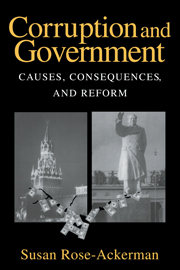6 - Bribes, Patronage, and Gift Giving
Published online by Cambridge University Press: 05 June 2012
Summary
Corruption is the misuse of public power for private gain. Agency–principal relationships in the public sector give rise to corrupt opportunities. This definition, however, simply assumes that a distinction exists between one's public and private roles. In many societies no such clear distinction exists. In the private sector, gift giving is pervasive and highly valued, and it seems natural to provide jobs and contracts to one's friends and relations. No one sees any reason not to carry over such practices into the public realm. In fact, the very idea of a sharp distinction between public and private life seems alien to many people.
Nevertheless, people in developing countries do make distinctions between appropriate and inappropriate behavior in terms of their own cultural norms. Formal surveys and informal discussions indicate frustration with corruption and suggest that expressions of toleration sometimes reflect both resignation and fear of reprisals against those who complain. Furthermore, even if gift giving and patronage are well accepted, they may impose hidden costs that are not well appreciated by ordinary citizens. Economics cannot answer cultural questions, but it can help one understand the implications of a society's choices. Societies can ask whether they have ended up with cultural habits that impose costs on the ability of the economy to grow and the government to function efficiently.
This chapter distinguishes between bribes, prices, tips, and gifts. The difficulty of distinguishing gifts from bribes has its roots in their fundamental similarity. In neither case will the legal system enforce a quid proquo.
- Type
- Chapter
- Information
- Corruption and GovernmentCauses, Consequences, and Reform, pp. 91 - 110Publisher: Cambridge University PressPrint publication year: 1999



